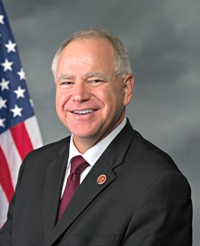Tim Walz and a Review of Gubernatorial 4-Year Term Three-Peats
Twenty-three of the last 28 gubernatorial bids for a third consecutive four-year term have been successful since 1970
 Minnesota Governor Tim Walz’s announcement on Tuesday that he will seek a third term in 2026 was expected even though such campaigns have been scarce in Minnesota over the decades.
Minnesota Governor Tim Walz’s announcement on Tuesday that he will seek a third term in 2026 was expected even though such campaigns have been scarce in Minnesota over the decades.
Walz joins DFLer Rudy Perpich as the only governors in the state to seek a third consecutive four-year term since gubernatorial terms increased from two years in 1962.
Perpich lost his bid for a third straight term in 1990 by 3.3 points to Auditor Arne Carlson. [Perpich also holds the distinction of being the only governor to lose two general elections in Minnesota history – also losing in 1978 by 7.1 points to U.S. Representative Al Quie].
Smart Politics previously discussed how a Walz victory next year would put him on the path to become Minnesota’s longest-serving governor, besting Perpich (who served 10 years and 12 days) on January 20, 2029.
Walz would also become the eighth Minnesotan to win three gubernatorial elections, though all others did so for two-year terms. Walz would join Republicans John Pillsbury (1875, 1877, 1879), Theodore Christianson (1924, 1926, 1928), Harold Stassen (1938, 1940, 1942), and Luther Youngdahl (1946, 1948, 1950), Democrat John Johnson (1904, 1906, 1908), Farmer-Laborite Floyd Olson (1930, 1932, 1934), and DFLer Orville Freeman (1954, 1956, 1958).
Most Minnesota governors in their second four-year term did not take the route of Perpich or Walz.
DFLer Wendy Anderson (elected 1970, 1974) resigned midway through his second term on December 29, 1976 in order to be appointed to the U.S. Senate following Walter Mondale’s resignation to become Vice-President. Meanwhile, Independent-Republican Arne Carlson (1990, 1994), Republican Tim Pawlenty (2002, 2006), and DFLer Mark Dayton (2010, 2014) simply chose to serve out their final term.
Overall, governors seeking a third straight four-year term have logged a record of 29 wins in 50 attempts in U.S. history.
Prior to 1970, only six of 22 such attempts were successful:
- 1930: Maryland Democrat Albert Ritchie*
- 1932: Montana Democrat John Erickson
- 1950: California Republican Earl Warren
- 1950: New York Republican Thomas Dewey
- 1962: Idaho Republican Robert Smylie
- 1966: New York Republican Nelson Rockefeller
[*Note: Ritchie is included in this tally even though his three four-year terms (in 1919, 1926, 1930) were technically sandwiched around a victorious bid for a three-year term in 1923 after the state resolved to stop holding such elections in odd-numbered years].
Since 1970, 23 out of 28 governors seeking a third consecutive four-year term were victorious including 12 of 13 since 1994:
- 1994: Colorado Democrat Roy Romer
- 1994: Wisconsin Republican Tommy Thompson
- 1998: Michigan Republican John Engler
- 2000: Utah Republican Michael Leavitt
- 2002: Connecticut Republican John Rowland
- 2002: New York Republican George Pataki
- 2008: North Dakota Republican John Hoeven
- 2010: Texas Republican Rick Perry
- 2014: Idaho Republican Butch Otter
- 2018: New York Democrat Andrew Cuomo
- 2020: Washington Democrat Jay Inslee
- 2022: Texas Republican Greg Abbott
Only Wisconsin Republican Scott Walker has been unseated during this period (2018).
Two-term Illinois Democratic Governor J.B. Pritzker has already launched his 2026 campaign while voters in Connecticut and Idaho are waiting on Democrat Ned Lamont and Republican Brad Little to make their third term reelection decisions respectively.
Follow Smart Politics on X.

I’ll be surprised if CT Governor Ned Lamont (D) & ID Governor Brad Little (R) both call it quits in 2026.
Indeed – Lamont said he was leaning toward running in June, but there is no announcement timeline yet. Little fended off a challenge from the right by 20 points in 2022 and no candidates are campaigning yet, which might suggest they think he will run (and will cruise to renomination) again.
Speaking of CT: Lamont recently announced he will seek reelection to 3rd term, which if completed, would make him the Nutmeg State’s second longest-serving Governor with 12 years.
https://en.wikipedia.org/wiki/2026_Connecticut_gubernatorial_election
BREAKING: Walz NOT seeking reelection as MN Governor in 2026.
https://en.wikipedia.org/wiki/2026_Minnesota_gubernatorial_election